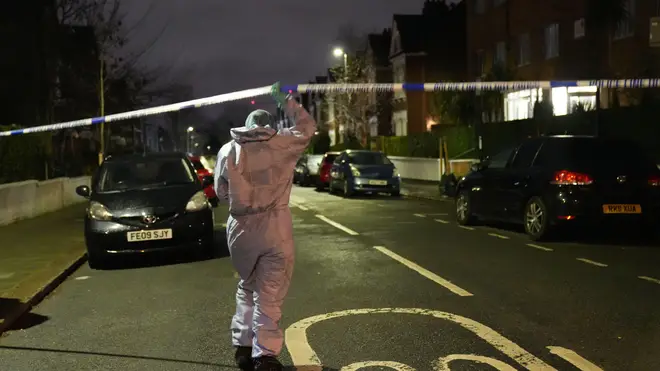
Oli Dugmore 4am - 7am
26 March 2024, 23:46 | Updated: 26 March 2024, 23:47

Churches have been warned they risk ‘undermining the integrity of the asylum system’ after Clapham chemical attacker Abdul Ezedi was allowed to stay in the UK, despite failing tests on Christianity.
Ezedi was granted asylum by a judge who accepted he was a Christian convert despite concerns the sex offender was a liar, newly-released court records show.
A raft of previously confidential documents disclose for the first time how the man police believe carried out a harrowing chemical attack earlier this year had been allowed to stay in the UK even though he had a criminal conviction.
It also emerged through rarely-made-public immigration tribunal court papers that he was granted asylum despite the Home Office warning that he had failed a Christianity test and was “using religion for his own ends”.
Ezedi claimed that the Old Testament was about Jesus Christ and that one of the apostles was called Jacob in a series of blunders during a Home Office interview to test the validity of his conversion, the Telegraph reports.
When Ezedi was asked to name Jesus’s main followers, he replied: “Simon, Peter, Jacob, Andrew…12 people, Disciples.”
Meanwhile, when asked about what God created on the third day, the attacker answered: “Good Friday and Easter Sunday and Resurrection Day.”
Home Office officials claim they told a tribunal that they did not accept that Ezedi's conversion was “genuine and long-lasting”, given his tendency to lie, but he was granted asylum anyway, despite several blunders.
Media organisations made legal representations to have the tribunal decision made public.
It shows the lengths the Afghan national went to evidence his apparent religious conversion from Islam, and how some of those who supported him during the process were aware of his crimes, with him even signing an agreement to be effectively escorted during church services as a result.
A Home Office source said the decision to grant Ezedi asylum risks 'undermining' the system entirely.

Pictures that emerged today along with the documents show Ezedi being baptised and handing out Christian leaflets in Newcastle.
He was found to have 'not been honest in several aspects of his account' by the asylum judge who heard his appeal to stay in the UK.
But a judge allowed Ezedi's appeal on asylum and human rights grounds, overturning a Home Office decision not to grant him leave to remain.
Ezedi's body was pulled from the River Thames last month amid a major man hunt launched after he was suspected of dousing his ex-girlfriend with alkali when he pounced on her and her children, aged eight and three, in Clapham, south London, in January.
It later emerged he previously avoided jail as the case sparked widespread debate about the role religion plays in determining asylum claims, while also raising questions over how the Government and courts scrutinise the validity of evidence presented in applications.
In a ruling dated November 10 2020, Judge WK O'Hanlon, sitting in the First-tier Tribunal (Immigration and Asylum Chamber), said: "Having considered all of the evidence before me in the round, notwithstanding my concerns as to the honesty of the appellant in relation to certain aspects of his account, I find that the appellant had been consistent in his evidence with regard to his conversion to Christianity."
Reverend Roy Merrin wrote to the tribunal in support of Ezedi and also gave evidence in person to his hearing at the First Tier Tribunal, in October 2020.
According to reports he submitted a letter to the tribunal which said ‘”Abdul has established a good relationship with the other Church members and is always willing to help”.
“Abdul has been ready to share his faith in Christ with non-Christians… I would support his application to remain in this country.”
The documents were released on Tuesday after the court granted submissions from the Daily Mail, the Daily Telegraph, the Times, the BBC, The Independent and the PA news agency, who argued disclosure was in the public interest.
Ezedi arrived in the UK on January 8 2016 but his initial asylum claim was refused by the Home Office, with an appeal later rejected by the courts the following year, according to the documents.

He was handed a suspended sentence at Newcastle Crown Court on January 9 2018 after pleading guilty to charges of sexual assault and exposure, instead being placed on the sex offender register for 10 years and ordered to carry out 200 hours of unpaid work.
Just over a year later, on March 19 2019, he challenged the decision again by lodging an appeal with the First-tier Tribunal (Immigration and Asylum Chamber), arguing he feared persecution because of his religion.
The papers confirm his claim was granted after a hearing in Newcastle on October 28 2020.
Lawyers representing Ezedi argued he had "converted from Shia Islam to Christianity (Baptist).
"The punishment for this in sharia law which is practised in Afghanistan would be execution", the documents said.
But, during proceedings, the Home Office's legal team said the Government department did not accept Ezedi's conversion was "genuine and long-lasting".